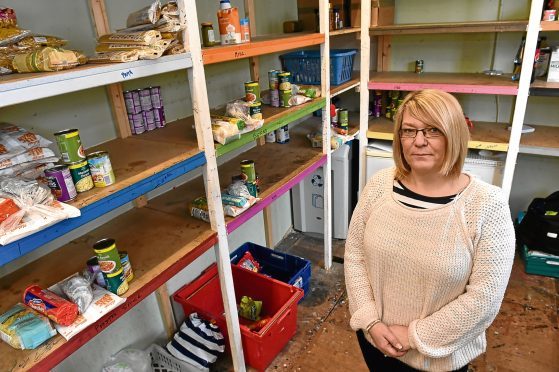New figures showing that food banks in the north-east handed out more than 27,000 emergency packages within 18 months have sparked calls for politicians to “do some soul-searching” and resolve the crisis.
The “truly shameful” statistics published today reveal that the 12 independent food banks in Aberdeen and Aberdeenshire distributed 27,062 parcels to people in need.
The packages, which contain basic food supplies designed to last three days, were handed out between April 2017 and last September.
Instant Neighbour, one of the Aberdeen-based organisations which formed part of the study, was forced to turn away desperate people when its shelves were cleaned out during a spell of unprecedented demand in 2017.
Community coordinator Evan Adamson said a “large proportion” of the parcels were being given to families with children.
He said: “It’s truly staggering to think about how many people in our community and across Scotland are relying on emergency food aid.
“At Instant Neighbour, we know that a large proportion of the food parcels we provide are going to families with children – which is really concerning.
“I hope these figures provide the impetus our political leaders need to do some real soul searching in order to come up with ways to prevent people from ever having to turn to a food bank for help.”
The new data, collected by the Independent Food Aid Network and Oxfam project A Menu for Change, takes into account figures from all 84 independent food banks in Scotland.
>> Keep up to date with the latest news with The P&J newsletter
During the 18-month period, 221,977 emergency food packages were handed out across the country by those groups.
The Trussell Trust, which operates 50 food banks in Scotland, distributed 258,606 food parcels – bringing the known total to 480,583.
Sabine Goodwin, coordinator of the Independent Food Aid Network, led the research.
She said: “These statistics are deeply troubling, and provide yet more evidence of the growing number of people in Aberdeenshire and across Scotland who are unable to put food on the table.
“People should be helped financially well before they find themselves having to turn to a food bank as a last resort.”
Experts warned that the new data only provides a “partial picture” of the number of people in Scotland who are struggling to feed themselves and their families.
They fear that most choose other ways of coping, like skipping meals, rather than using a food bank.
Research shows that problems with the UK-wide benefits system is one of the key drivers of food bank use, but A Menu for Change says the Scottish Government must act to prevent people in Scotland from being pushed further into poverty.
Scottish ministers have promised to bring in a new income supplement by 2022 to help the nation’s poorest families, but campaigners say people facing hardship can’t afford to wait three years for the extra support.
Mary Anne MacLeod, research and policy officer at A Menu for Change, said: “These figures are truly shameful in rich Scotland and they should make for deeply uncomfortable reading for our political leaders: the problem of rising levels of hunger in Scotland is much worse than previously known.
“The Scottish Government should be commended for its plans to help families put food on the table through the new income supplement, but promises to help people in three years’ time are of little comfort to parents whose cupboards are empty right now.”
Communities Secretary Aileen Campbell said: “I absolutely agree that it is unacceptable that people are having to rely on charity to eat in a country as prosperous as Scotland and that this government has to spend £125 million to mitigate against the worst impacts of UK Government benefit cuts.
“We will also provide £3.5 million in 2019-20 for our Fair Food Fund to support organisations responding to food insecurity.
“Significant work is being taken forward on our low income supplement and an update on this will be provided to parliament by June.
“Scotland is taking concrete action to eradicate child poverty – we are the only country in the UK with legal targets to do so, all while continuing to mitigate the welfare cuts and failed policies of the UK Government which are set to reduce social security spending in Scotland by £3.7 billion in 2020-21.”
